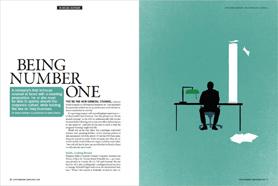 You’re the new general counsel, or lawyer for all occasions, at All-Purpose Enterprises Inc. Your title hasn’t been precisely worked out yet, in part because you’re the first in-house counsel they’ve ever had.
You’re the new general counsel, or lawyer for all occasions, at All-Purpose Enterprises Inc. Your title hasn’t been precisely worked out yet, in part because you’re the first in-house counsel they’ve ever had.It’s a growing company with expanding legal requirements — or they wouldn’t have hired you. Your first priority is to “hit the ground running,” as the CEO so enthusiastically told you just moments before showing you to your new office and leaving you to “get settled in.” And now all you need to know is what she imagined “running” might look like.
Should you set up your office, hire a paralegal, read board minutes, tour operating facilities, review corporate policies or risk assessments? All of the above? Or did the CEO have something else entirely in mind? You’re not quite sure what the executive and the board of directors expect, and they aren’t either. Time will tell. But by then, success will either be firmly in hand or well and truly out of reach.
INSIDE, LOOKING AROUND
Harpreet Sidhu is General Counsel, Corporate Secretary and Privacy Officer for Toronto-based Pethealth Inc., a pet insurance provider in Canada, the US, UK and Germany. She was hired in 2013, after articling with a small general-practice firm, to manage Pethealth’s legal work across the international business. “When I first started at Pethealth, we had no other in-house lawyer and we still don’t,” Sidhu says. “I still remember that first day. The [former] CFO handed me the keys to my office, gave me a corporate credit card and literally said, ‘Good luck starting the new legal department.’
“My first week, I was lost,” she recalls. “I was trying to understand the dynamics of what was, for me, a new and unknown business, while initiating the legal components. Most of the business people were not accustomed to ‘running things by legal,’ so, for starters, I had to get people to notice me and let them know that I was serious and here to stay. Now, not an hour goes by when I don’t have someone outside my office asking me to check documents before they sign.”
Robert Soccio is solo General Counsel, Corporate Secretary, Compliance Officer and HR Director for the Canadian subsidiary of Chicago-based diesel truck manufacturer Navistar. Hired away from the securities group at a major national law firm, Soccio says the transition to in-house work, especially a solo role, should not be underestimated. “It’s a major change, and it’s a really personal decision,” he says. He’s emphatic that it’s not a way to simplify one’s life or escape the all-hours grind of Big Law. As opposed to working at a law firm, there’s no such thing as relying on a single area of specialization. “When you’re the only lawyer and people are looking to you for answers, you have to have a broad understanding of the law — and depth in some areas. The GC role is all-encompassing. You’re the go-to guy and your time is in demand. You really have to be accessible.”
Megan Vesely was recruited from an associate’s role in the San Francisco securities group of DLA Piper to become solo General Counsel for Sigma Analysis & Management Ltd., a Toronto-based specialist in risk analytics for institutional investors. “My first day, we had a securities issue to deal with — nothing specifically to do with Sigma — but I really had to hit the ground running,” she recalls. “It was a fast and furious experience and there was no time to worry about fitting in.” She was Sigma’s first in-house lawyer, but she says the academic and collegial culture of the company meant that “I certainly wasn’t viewed as a three-eyed monster.”
OUTSIDE, LOOKING IN
Chris Burr practised at Blake, Cassels and Graydon LLP in Toronto before leaving briefly to become general counsel for a start-up venture capital company. Now back at Blakes, he’s a partner in restructuring and insolvency, whose role also includes advising client companies when they decide it’s time to develop internal legal capabilities.
Burr says that, for a growing company, the rising cost of outside legal services is almost invariably a motivator in the decision to hire an in-house lawyer. As the company grows, so does its exposure to legal issues and “fees of external counsel, across the board, are going up.” When this double whammy captures the attention of company directors, hiring in-house counsel is the standard response. He adds that outside counsel will, in all likelihood, still be required on a regular basis. But there will be in-house legal expertise to manage assignments and costs.
Burr says companies frequently make the move to in-house counsel with the hope of achieving a bespoke fit in legal services. “There’s no substitute for having somebody in-house, on the ground, who really lives and breathes the [corporate] culture,” he says. Part of that value lies in communications — translating the company’s needs to the law firm. “Lawyers just speak to other lawyers more easily,” he explains.
By fully absorbing the corporate culture and understanding the company’s business, he adds, an in-house lawyer is also far better placed than an outside firm to fill the role of trusted advisor, providing a legal perspective for advice and input across the broad range of corporate strategy and operational planning.
Terry Burgoyne, a partner in M&A, joint ventures and commercial agreements with Osler, Hoskin & Harcourt LLP in Toronto, also regularly advises clients on establishing in-house legal services. He says the move isn’t always motivated by cost control and it doesn’t always come from within the company.
“I’ve sometimes recommended that clients hire an in-house lawyer,” Burgoyne says. “Where I think in-house counsel can be particularly effective is with recurring contracts.” But he says that doesn’t mean blessing the same boiler-plate verbiage, ad infinitum. It means knowing the company well enough to vary standard contracts in ways that add value and head off undue risk. “Where there’s no inside legal capacity,” he says, “small contracts may never get legal oversight and it could be the company has run into a problem. Most business people will know what they don’t know — and they’ll want to address that at some point.”
Typically, Burgoyne says, in-house counsel would still hand off big deals, such as mergers and acquisitions, to outside counsel. But some clients that do a lot of M&A as their primary growth strategy will hire an in-house lawyer with acquisitions experience to manage that work.
In some cases, he says, companies hiring their first in-house counsel may not be small or even medium-sized. They may be fairly large Canadian subsidiaries of multinational companies that have previously gotten by on legal advice from a foreign head office, perhaps for too long. Offshore legal advice becomes increasingly risky as the subsidiary grows and, he says, it may well be the head-office legal team that recommends the Canadian sub hire its first in-house counsel.
Burgoyne says that another important contributing factor in a company’s move to in-house legal capacity may be a rising regulatory burden. In Establishing the In-House Legal Department: A Guide for an Organization’s First General Counsel, the Association of Corporate Counsel (ACC) cites a growing plethora of financial, securities and environmental regulations and more stringent corporate governance requirements, from 2000 onward, as reasons for bringing legal talent inside.
The ACC also notes that a need for more proactive legal advice may be a key driver. While an outside law firm is often retained on fairly narrow parameters, an in-house lawyer is better positioned to provide proactive advice on looming issues before they get hot.
Sidhu says there’s no doubt rising legal cost was a motive in the creation of her position, but there were other considerations. “All the legal, regulatory and compliance work was sent to outside counsel, which was obviously getting too expensive. It was also very reactive — lawyers were only called to put out fires. The company started doing more M&A deals and the business model is so unique that it was getting harder for our executives to explain to outside counsel each time. As I emerged into the role, things became more proactive and the need for in-house counsel grew.”
TO BE OR NOT TO BE
Having decided to hire its first in-house lawyer, a company must set about finding the perfect — or near perfect — lawyer for the position. And, of course, candidates will have their own reasons for wanting the job. Vesely simply says she felt her career path needed to include an inside business perspective.
Soccio points out that working as an associate for Big Law is largely technical and transactional. “GC work is about building continuing relationships, and there are a lot of softer skills that you need. Working within a business, a group of people in a teamwork situation, is something I thrive on and enjoy,” he says.
As a counterpoint, Burr says he returned to Blake, Cassels & Graydon LLP from the venture capital company where he was in-house because, “I prefer working in a firm environment, with a variety of clients and a variety of problems. Working in-house, you get to know your company intimately, and get to understand the kinds of problems and needs the organization has, but I found that it became too routine. At Blakes, when I wake up in the morning, I never know for sure how my day is going to go.”
Burgoyne and Burr argue for recruiting an experienced associate from a major law firm over hiring a fresh-faced graduate out of law school. What the company gains in reduced salary cost and being able to mould a rookie lawyer to the corporate culture is more than amply offset by the law grad’s inexperience. While Big Law backs its newbies with all the resources of the firm, a rookie in-house lawyer has no such safety net. And, while many companies like to hire malleable youngsters for nearly all positions, a broader perspective and a certain stiff-necked independence are arguably good qualities in a trusted legal advisor.
Sidhu concedes that a solo in-house lawyer straight out of law school may have to scramble at first, but she says there are ways to make up for the lack of a Big Law security blanket. “A legal network is important,” she says. “I never knew anyone when I started this role, but it just happened. I started going to a lot of [Canadian Corporate Counsel Association] events and just started introducing myself. … I made it a point to join panels. The problem for solo in-house counsel is, we don’t have a team of five or 10 lawyers to bounce ideas off of, so it’s important to keep a good rapport with outside counsel.” She adds that building a bank of favours is helpful and nominating other lawyers for awards is a good place to start. “And if you read a good article, send a quick note to the writer.” It all helps the solo in-house counsel to build a network he or she can rely on for legal expertise and moral support.
Burgoyne says many companies look to recruit their first internal lawyer from the in-house legal department of another company, in part because these people may have acquired a more entrepreneurial, business-focused outlook than an associate from a big law firm. A related issue is that lawyers from large firms may be accustomed to a large support system, while at a company “they’re on their own for the first time in their careers.”
Other companies may prefer to hire an associate from their outside counsel. “More [associates at big firms] go in-house than become partners,” Burgoyne observes. He says it’s an established trend, which is driven by law firms tightening up on partnerships and by an increasing numbers of lawyers choosing career paths outside the partner track — not just as a fallback position but as a first preference.
“Careers in-house are much more varied now than they used to be,” partly because companies are starting to build larger internal legal teams to handle a wider variety of issues, he says.
TIES THAT BIND
Burgoyne says he was recently asked by two client firms to recommend lawyers for in-house positions. In one case, he suggested an Osler alumnus and in the other he didn’t.
Burr says major law firms have plenty of experienced, talented associates who would welcome an in-house opportunity, and an alumna who moves to an in-house position can improve communications between the client company and the outside law firm. Alumni placements, he says, also help cement the relationship between his firm and client companies. But he says the first priority has to be ensuring the client gets a top-notch lawyer, with extensive experience in the areas most relevant to the business.
Burr says he starts by asking the client where the company feels it has gaps in its everyday legal oversight, in order to get a clear picture of the type of legal know-how they need. In smaller companies, he says, the personality of the CEO may also be a deciding factor in his recommendation for an in-house position.
“A brash, impulsive CEO may need a voice of reason,” but he says that could also prove to be an oil-and-water mismatch. “The best choice might be someone who can identify risk and shut up.” It’s a judgment call that tests the outside firm’s knowledge of its client.
THE LONG VIEW
Outside legal advisors agree that companies seeking to hire their first in-house lawyer should, in most cases, take a long and wide perspective. Companies should consider both the professional and leadership potential of that critical first legal hire. Put simply — can the candidate be expected to become a general counsel capable of running a legal department that expands with the company?
“I think you want to hire the best person you can hire, within your ability to pay,” Burgoyne says. “A company should be looking to hire someone who can grow [as a lawyer] and grow the role itself — but that’s a generalization.” A company with limited legal exposure may want a lawyer who simply reviews contracts, he says.
“You almost always want a future leader,” Burr says, “someone who can later oversee three people or ten people, as the company grows.” The exception might be a company in a highly regulated industry, “where what they really want might be a compliance officer. In those cases, they probably don’t want somebody who’s particularly entrepreneurial.”
The ACC’s Guide says a company may need its first in-house counsel to be “a leader, a manager or both.” A manager will concentrate on the legal process, to ensure the right systems and procedures are in place to meet narrowly defined legal needs. A leader will advise the executive and board of directors to help ensure the company is focused on the right priorities, both legally and strategically. The ACC says a company hiring its first lawyer may be looking for an immediate or future general counsel who can handle both technical and strategic responsibilities.
When the company’s first lawyer is finally chosen, the ACC Guide says, he or she will likely face an array of misplaced expectations, some of which will require deft management. These frequently include: requests for personal legal advice from highly placed people; a belief that the new lawyer should only be consulted on strictly legal issues and excluded from broader business planning; reluctance to seek legal advice in the belief it will unduly restrict business options; expectations of legal omniscience across all areas of law; and imagining that every conversation is protected by solicitor-client privilege.
The Guide advises the company’s first lawyer to, at the earliest opportunity, arrange time to speak with key clients about what an in-house lawyer can and should do. The solo lawyer should explain that in-house counsel is confined to advising on company business; working with senior management to define the role of counsel; and he or she should meet with staff groups to explain who is and is not a corporate client. The Guide also suggests that in-house counsel should provide seminars to educate clients on legal requirements, such as document retention, not least of all to avoid being perceived as a nag.
ABOMINABLE NO-MAN
Burr says the perception is fairly common within small, highly entrepreneurial companies that the new lawyer will be a No-man, or -woman, best avoided and thereby foreclosed from saying “no” to some cherished business idea.
But he adds that, sooner or later, that expectation will be fulfilled when the in-house counsel is forced to frown on some business proposal and when that happens the lawyer needs to be prepared. “The business people just want to get the deal done and you’re going to be the person who says ‘no,’ so you should have an alternative,” he advises. The lawyer who can propose another means to the same or similar end will be more trusted and far more frequently consulted than the one who simply gives the legal “no” to a business opportunity.
Burgoyne says avoiding or reducing legal risk “without saying, ‘You can’t do that,’” is vital to the success of every in-house lawyer, and especially the new, solo legal counsel. “You build credibility with operations people by finding a way to get the deal done,” he says. This approach also leaves you better positioned at the end of your first year, when it comes time to justify your existence — when you can, hopefully, point to risks avoided and projects enabled.
“You have to learn how to be an internal advocate, as opposed to an issues spotter or legal nay-sayer,” Vesely says. “It’s about identifying risks and suggesting the most appropriate way to deal with them.”
Sidhu says keeping the confidence of senior executives requires an understanding that they are oriented to assessing and minimizing risks, rather than turning away from them. “They don’t want to hear what they can’t do,” she says. “They want to know what they can do.”
“Understanding the vision of the CEO is vital,” Soccio says. “The key question is, ‘How can we do this?’ Becoming an in-house counsel requires a change of mindset.” It means becoming comfortable emphasizing the entrepreneurial over the purely technical perspective. “Before you take the job, you have to know who you are and what you really live to do.”




